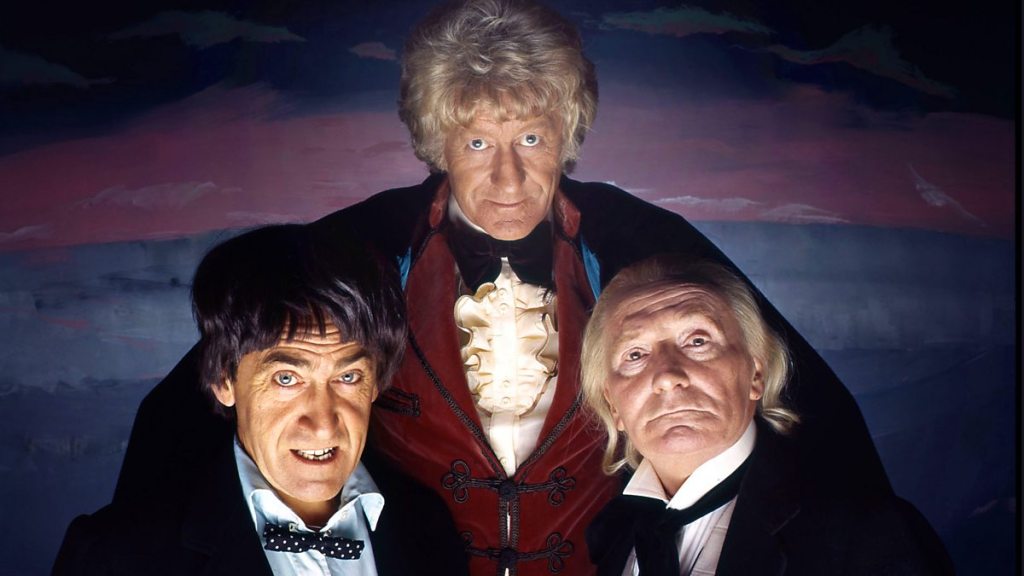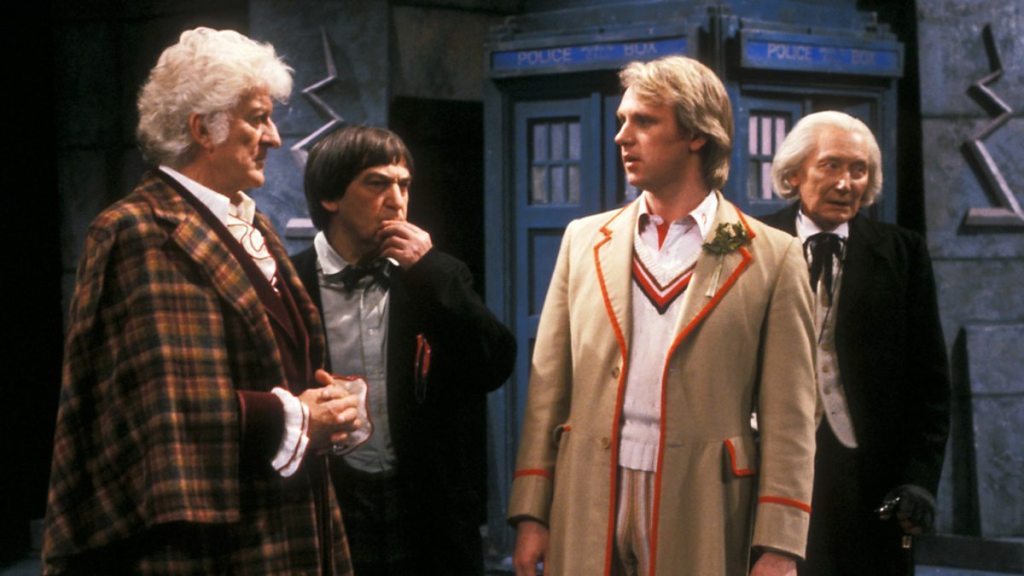Warning: contains spoilers for every multi-Doctor story on TV.
Multi-Doctor stories – what they are and what they try to do – are hugely shaped by the context in which they’re made. Very broadly speaking, they can be approached in two ways: ‘The Three Doctors’ and ‘The Day of the Doctor’ are examples of multi-Doctor stories that use the recent storylines of the show as a starting point, and have the story change the existing status quo (with the Doctor being able to pilot the TARDIS again after ‘The Three Doctors’ and the restoration of Gallifrey in ‘Day of the Doctor’). By comparison, ‘The Five Doctors’ is a fun but heartfelt runaround of the show’s cliches and iconography.
However, it’s not as simple as that. All of these stories revel in nostalgia, and even the romp of ‘The Five Doctors’ has a twist long-standing character from the Doctor’s past turn out to be the main antagonist while adding to Time Lord mythology. There’s not really a straightforward binary to divide them with. Even ‘The Two Doctors’, which isn’t an anniversary story or celebration, impacts on the show’s mythology (albeit due to a continuity issue that got explained by adding a hidden season onto the Second Doctor era, after his final story ‘The War Games’). This is the multi-Doctor story that exists solely because producer John Nathan-Turner thought multi-Doctor stories were cool and that there should be another one.
So, what makes a good multi-Doctor story? It depends who you ask, but fan polls tend to place ‘The Day of the Doctor’ as the best, followed by ‘The Five Doctors’ then ‘Three Doctors’. These all place fairly evenly across the top sixty stories or so, with ‘The Two Doctors’ somewhere in the lower half. Each story takes a different approach, so calling for a 60th anniversary special to match your personal taste is tricky, because saying ‘I just want a big old nostalgia hit’ ignores why anniversary specials end up the way they do. All these stories are the way they are because of the context of production; the 60th anniversary will be no different.
The Three Doctors
Christopher Eccleston recently commented that multi-Doctor stories didn’t work for him creatively, and that he regarded them as ‘a bit of a cash grab’. In some senses he’s right, because ‘The Three Doctors’ was commissioned as an attention-grabbing piece of event television to start the show’s tenth series. This doesn’t seem cynical, though, so much as a sensible programming decision by the production team.

At the time it was also completely novel – there hadn’t been a multi-Doctor story before and producer Barry Letts had resisted the idea. It was only for the 10th anniversary that Letts felt such a story was justified, and that this would also be a good opportunity to restore the Doctor’s ability to pilot the TARDIS and change the show’s contemporary Earth-bound setting. The additions to Time Lord history were not part of the original script, but came about when the standard feedback and redrafting process resulted in changes to the original concepts (the three Doctors attempting to avert a war between Gallifrey and a ‘Federation of Evil’ – according to the Brief History of Time Travel website). ‘The Three Doctors’ started on 9.6 million viewers in 41st place on the viewing charts, and ended it with 11.9 million viewers and in 17th place, so Letts’ season launch was a success, and Doctor Who had fully moved away from being set in one place and time.
The Five Doctors
This set the precedent for the 20th Anniversary special, ‘The Five Doctors’, with John Nathan-Turner beginning the preparations for a multi-Doctor story in 1981. The reason the story ended up as a feature length episode is because Doctor Who was now being broadcast from January, and the BBC were unable to move it in the schedules because lead actor Peter Davison was committed to filming the sitcom Sink or Swim for them too. This meant that Doctor Who wasn’t scheduled to be airing during its anniversary month of November, so a 90-minute special was proposed.
Writer Robert Holmes began working on a story called ‘The Six Doctors’, but struggled with it. Holmes was not hugely interested in working with other writers’ characters and playing the hits, and so this was not the project for him. Terrance Dicks, another former script editor on the show, came in and managed to find a story that fitted the brief. Dicks was probably the finest nuts-and-bolts writer in the show’s history, so much so that even his novel ‘The Eight Doctors’ – written to launch the BBC Books line of Eighth Doctor adventures after the 1996 TV Movie – manages to be incredibly readable despite it consisting of Dicks writing sequels to his own stories and savaging the bits of Doctor Who he didn’t like.
The fact that ‘The Five Doctors’ also involved the Time Lords was potentially a result of Dicks replacing Holmes as the writer, as Dicks decided to build on Holmes’ depiction of Gallifrey in ‘The Deadly Assassin’. As with ‘The Three Doctors’ the expansion of Time Lord mythology was not part of the original concept for the story, but was added as it developed.

After being presented with a list of items to include (some of which were added and removed based on actors’ availability/willingness to be involved) Dicks’ instincts in terms of both nostalgia (he insisted the Daleks make an appearance) and telling a good story were almost entirely correct. Despite the rewrites it entailed, Tom Baker’s late withdrawal from the project ultimately benefitted ‘The Five Doctors’, as otherwise the First Doctor would have spent most of the story stuck in the TARDIS. Being given a list of requirements can be a constraint rather than a foundation, as Robert Holmes found out. Twice.
The Two Doctors
If the ‘The Two Doctors’ could be considered a cash grab, it failed. The fourth story of Season 22, it had the lowest average viewing figures per episode, with ratings going down for episode one from the final part of ‘The Mark of the Rani’. John Nathan-Turner asked for another multi-Doctor story and wanted it to be partly filmed in New Orleans to appeal to American fans. The funding fell through and the story was relocated to Seville after Robert Holmes had already drafted a story based around the New Orleans setting (creating a race of food-obsessed aliens and writing a story about vegetarianism as a result). There are some thoughtful defences of this story (Rob Shearman’s, for example, in About Time vol. 6), describing ‘The Two Doctors’ as the opposite of a celebration, a scabrous satire on Doctor Who itself and what an audience will accept as monstrous. Whichever interpretation of it you go along with, this is darkly comic and provocative, and so stands out among the multi-Doctor stories. Nonetheless, it continues the tradition Holmes established in ‘The Deadly Assassin’ and Dicks continued in ‘The Five Doctors’ of making the Time Lords seem morally murky.
Robert Holmes and Steven Moffat are very different writers, but Moffat’s multi-Doctor stories move from celebratory to discursive, with different eras of the show in conversation with each other. In this way both writers use multi-Doctor stories to write Doctor Who about Doctor Who. Due to Moffat writing his stories after the show had been off-air (for sixteen years between 1989 and 2005) his stories have this gap to address and bridge. Hence when the idea of the War Doctor developed, Moffat was able to use him to represent what has now become known as ‘The Classic Series’ Doctors. This was a relief for Moffat, because he felt pressure to include previous Doctors but knew that the story he wanted to tell precluded this. This allowed him to have a representative of the original run interact with and critique the post-2005 series.
Time Crash, Day of the Doctor, and Twice Upon a Time
With his Children in Need special ‘Time Crash’ Moffat has the Tenth Doctor/David Tennant explicitly connect Peter Davison’s Fifth Doctor with the current incarnation of both character and show. In his final script for the show, Moffat has David Bradley’s First Doctor and Peter Capaldi’s Twelfth interact. The most successful part of this is the First Doctor witnessing the violence and horror of Doctor Who unfold in front of him, especially the escalating stakes of the post-2005 series, and see his future as being the ‘Doctor of War’ (the response from Twelve, “To be fair, they cut out all the jokes”, is amazing). Again we see a Doctor from the original run interrogating and responding to tropes of the newer series. Moffat being a more romantic cynic than Robert Holmes, these questions end up with happier answers.

All three of Moffat’s multi-Doctor stories are influenced by their production situations, especially ‘The Day of the Doctor’. With Eccleston not returning, Moffat needed to change his plans, and the invention of the War Doctor was huge for the story itself, the mythology of the show, and to allow the meta-commentary mentioned above. With the Ninth Doctor this simply would not have had the same impact or worked in the same way. ‘Twice Upon a Time’ exists largely because Moffat didn’t want Doctor Who to lose its Christmas Day slot, with the new production team unwilling to launch with a Christmas episode, and so an extra story was written for the Twelfth Doctor. Moffat, as he often did, turned the show in on itself and wrote a partially successful story about memories, and the influence of the past on the future and the future on the past.
The 60th Anniversary?
So in terms of the 60th Anniversary episode, can we say with certainty what needs to be in it?
Nope.
That was worth waiting for wasn’t it? Nonetheless, let’s hypothesise. Previous stories teach that actor availability is a huge factor. We don’t know what happens in the final Thirteenth Doctor stories at this stage. We don’t actually know for sure, despite the rumour mill, that the anniversary episode will be a multi-Doctor story. We don’t know what a Russell T. Davies-written multi-Doctor story will be like exactly, but we know from stories like ‘Journey’s End’ and ‘The End of Time’ that Davies has a track record of delivering big, popular hits when celebrating the show that feature ensemble casts. These were celebrations specifically of the era of Doctor Who he had helped create, with multiple returning characters involved, but this was after four series of incredibly popular television. The context for the 60th anniversary is of an older show in a different TV landscape.
Can a multi-Doctor story even function as a stepping-on point or soft reboot? It seems unlikely, but not impossible. Looking back at Davies’ Doctor Who, especially the first episode of the 2005 series, the way in for the audience was through the companion. We saw the Doctor through her. Perhaps, then, a better way to indulge in nostalgia in the current context is to have a multi-companion story: we know Davies can write these based on ‘Journey’s End’, and this would allow for different perspectives on the show’s history to interact, shedding new light on the title character while celebrating the entirety of Doctor Who.
Anyway, that’s my guess. I can’t wait to be wrong in 20 months’ time.
The post Doctor Who: What Makes a Great Multi-Doctor Story? appeared first on Den of Geek.


0 Commentaires